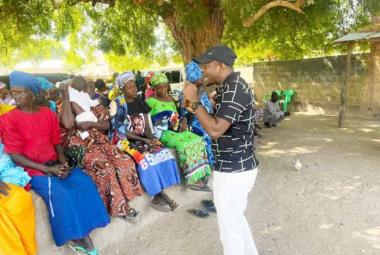By Maraitou Ngum
The minister of Trade, Industry, Regional Integration and Employment has indicated that trafficking in person and smuggling of migrants are global and widespread crimes that affect men, women and children in different ways, thus requiring multi-sectoral partnership for solution.
Hon. Baboucarr Ousmaila Joof recently made these remarks while presiding over the opening ceremony of the University of The Gambia’s Debate Association’s Inter-Tertiary Debate Championship held at the Sir Dawda Kairaba Jawara International Conference Centre.
The topic was “Enhancing the capacity of young people for the effective combating of Trafficking in Person and Smuggling of Migrants”, and was attended by students and officials of tertiary and other academic institutions.
Hon. Minister extended appreciation of His Excellency President Adama Barrow and the Government of The Gambia to the United Nations Office on Drug and Crime (UNODC), other development partners; especially IOM and United States Embassy in The Gambia for their work and support to efforts towards combating trafficking in persons and migrants in The Gambia.
He described trafficking in persons as a human rights abuse, and that combating it requires concerted efforts.
‘‘The fight to combat human trafficking requires, first of all, the enactment of laws to criminalise both trafficking in persons and smuggling of migrants. It is important to note that the Government of The Gambia has enacted a law (Trafficking in Persons Act 2007) to prevent, suppress and punish those engage in the trafficking of persons and is working towards enacting a law that will criminalise smuggling of migrants and punish culprits,” he said.
Minister Joof revealed that they have also formulated policies to promote investment, development of industries and SMEs to create more jobs for the young population.
“We hope that these policies and programmes will facilitate the creation of more job opportunities for all and with more job opportunities and well-informed young people, there will be a decrease in the number of people embarking on irregular migration thereby saving their youthful population,” he concluded.







